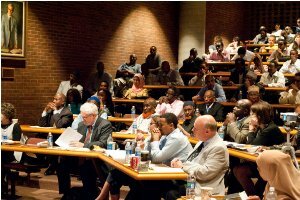 Bartamaha(Nairobi):- nstitute for Horn of Africa Studies and Affairs (IHASA) held its annual conference on the weekend of June 18th to June 20th, 2010 in collaboration with University of Minnesota’s Human Rights Center. The theme of the conference this year was, “Looking Back and Looking Forward: The Somali Region (the Ogaden) in the 21st Century.†The conference brought together prominent community leaders, distinguished academics, and human rights organizations to discuss the current political, social, and economic issues surrounding the Ogaden Region as well as future prospects for peace. The Ogaden Region has been torn apart by the ongoing conflict which resulted in hundreds of innocent lives lost and significant human rights abuses.
Bartamaha(Nairobi):- nstitute for Horn of Africa Studies and Affairs (IHASA) held its annual conference on the weekend of June 18th to June 20th, 2010 in collaboration with University of Minnesota’s Human Rights Center. The theme of the conference this year was, “Looking Back and Looking Forward: The Somali Region (the Ogaden) in the 21st Century.†The conference brought together prominent community leaders, distinguished academics, and human rights organizations to discuss the current political, social, and economic issues surrounding the Ogaden Region as well as future prospects for peace. The Ogaden Region has been torn apart by the ongoing conflict which resulted in hundreds of innocent lives lost and significant human rights abuses.
The Founder and Executive Director of IHASA, Hamse Warfa, presented information at the conference on the gravity of the situation in the Ogaden and the importance for the refugees and immigrant communities to fight for justice in their homeland. The aim of this conference was to generate publicity for the injustices endured by the people of the Ogaden, unite those involved, and discuss possible peaceful solutions. IHASA was recognized for its efforts in promoting peace and justice as it received letters of endorsements from Senators Barbara Boxer, Diane Feinstein, Byron Dorgan, Kent Conrad, Amy Klobuchar, and Congressman Earl Pomeroy and Susan Davis.
Mayor of Minneapolis, R.T. Rybak opened the conference with his remarks concerning the importance of reaching out to immigrant communities in Minneapolis and promoting peace and justice worldwide. Mayor Rybak stressed the importance of the youth in this generation and explained that it is crucial for elders to find a tangible way for children to become involved in the community. Nimo Warfa, only a junior in high school, presented at the conference and serves as precisely the example Mayor Rybak described in his opening remarks. Ms Warfa astounded the audience with her resilience when she declared that she would never accept oppression and instead become a “voice for the voiceless.” Ms Warfa has published a collection of her writings and presented it to the audience while urging her peers to join her campaign for justice.
In addition, respected members of the Diaspora community as well as distinguished scholars including Dr. Edmond Keller from UCLA, Dr. Asfaw Beyene from SDSU, Dr. Samantha Hurst from UCSD, Dr. Ted Vestal from Oklahoma University, Dr. Ali Khalif Galaydh and many others presented their research in front of a community forum. One of these scholars, Dr. Bereket Selassie, Former Attorney General of Ethiopia, and the Former chairman of the Constitutional Commission of Eritrea and author of the constitutions of 17 countries presented information on the political structure and pitfalls of the Ethiopian government and how this has affected the conflict in the Ogaden. In addition, Faisal Roble, a prominent community leader and scholar presented information comparing the Ethiopian conquerors and the Somali people, the true stakeholders in the Ogaden crisis, and how the these two groups have shaped the conflict. Many speakers such as Dr. Theodore Vestal discussed the need for conflict resolution for this region. The role of American Foreign Policy and its affects on the conflict were also discussed at length.
Overall, the conference was a huge success and many important topics regarding the Ogaden were presented in front of a large audience. The topics ranged from accounts of torture and abuse the people have endured, to insightful tips on healthcare services in the Ogaden by Medecins Sans Frontieres speaker David Michalski to potential blueprint for successful conflict resolution in the Ogaden. In addition, Leslie Lefkow, a senior researcher for Human Rights Watch spoke about the difficulties of investigating and documenting human rights abuses in the Ogaden due to strict government restrictions.
The caliber of presenters at the conference was remarkable and many new ideas were mentioned regarding conflict resolution strategies. The audience was greatly invested in the question and answer sessions held after every panel, and many important inquires into the speaker’s research were discussed. More than 800 peopled attended on both days.
Source:-(IHASA).



